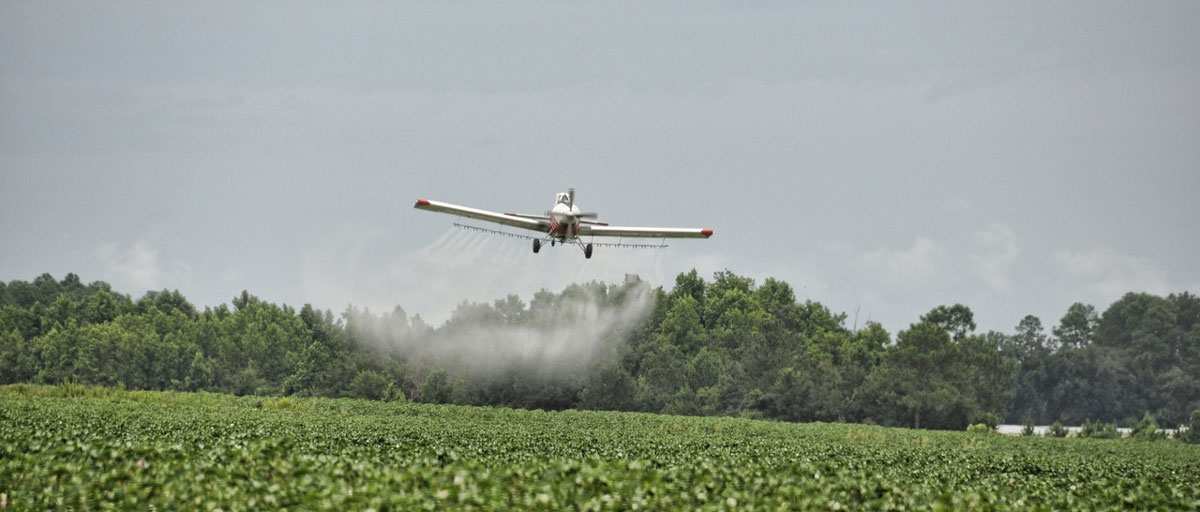
A recent paper in Nature Ecology and Evolution identifies a handful of transnational corporations that disproportionately control the planet. Examples include the four companies that control 84% of the agricultural pesticides market. This concentration of power comes with a great deal of responsibility and opportunity, it could be turned into a positive force for sustainability, the authors conclude. Photo: PxHere
Bildtext får vara max två rader text. Hela texten ska högerjusteras om den bara ska innehålla fotobyline! Photo: B. Christensen/Azote
SUSTAINABLE BUSINESS
Time for corporate biosphere stewardship
A handful of transnational corporations hold enough power to accelerate (or hinder) transformations towards sustainability
• A small number of transnational corporations disproportionally influence the planet’s climate and ecosystem
• This concentration of power comes with a great deal of responsibility that could be turned into a positive force for sustainability
• Six positive signs of change towards such ‘Corporate Biosphere Stewardship’ are identified
'If you are very strong, you must also be very kind.' This famous quote from Pippi Longstocking pretty well summarizes the message of a recent paper in Nature Ecology and Evolution.
The paper, which identifies a handful of transnational corporations that disproportionately control the planet, is written by a group of centre researchers and colleagues from Europe, USA and Australia. This concentration of power comes with a great deal of responsibility and opportunity, it could be turned into a positive force for sustainability, the authors conclude.
Actions by transnational corporations, if combined with effective public policies and improved governmental regulations, could substantially accelerate sustainability efforts
Carl Folke, lead author
Tracing back emissions to 100 companies
The authors, lead by centre researcher Carl Folke along with a extended team of colleagues from the Stockholm Resilience Centre, the Beijer Institute of Ecological Economics and beyond, first review some of the evidence behind this statement. For example, they refer to other studies which show that more than 70 percent of the world's greenhouse gas emissions can be traced back to 100 companies. Similarly, a handful of transnational companies dominate agriculture, forestry and fisheries, which are major drivers of environmental change and biodiversity loss.
Examples include the four companies that control 84% of the agricultural pesticides market, the ten companies that account for 25% of the total paper and board production, and the five companies which account for 48% of global farmed Atlantic salmon (see infographic below).
“Transnational corporations in agriculture, forestry, seafood, cement, minerals, and fossil energy cause environmental impacts and possess the ability to influence critical functions of the planet’s climate and biosphere,” they write.

Roadblocks or role models?
The authors emphasise that, so far, voluntary corporate social and environmental responsibility has been too ineffective. They also dwell on the risk for market concentration and corporate power to act as roadblocks due to prioritising economic profit over non-market values. In addition, some transnational companies have used their power to lobby regulators to weaken environmental and social standards.
“In the face of insufficient environmental agreements and regulations, dominance poses a threat to sustainability. For instance, companies able to set barriers to entry in a sector can stifle sustainable practices and technological innovation in general,” they write.
Consequently, corporate leadership in itself is unlikely to be sufficient, the authors say. The global-scale corporate biosphere stewardship they suggest will only be possible if governments around the world also provide “a regulatory context that safeguards non-market ecological and social values”.
Six positive signs to build upon
So, what needs to happen to ensure that these big corporations live up to their potential as sustainability leaders on a global scale? To answer this question, the authors identify six observed positive signs of change towards ‘Corporate Biosphere Stewardship’, which they believe could and should be scaled up:
1) “Alignment of vision” – new norms are emerging among some of the largest brands, broadening the vision from profit only to responsibility, ethics, and purpose
2) “Mainstreaming sustainability” – in 2017 more than 70% of global companies mentioned the Sustainable Development Goals in their corporate reporting and 27% included them in their business strategy
3) “License to operate” – governments increasingly create legal requirement for large companies to identify and prevent abuses on human rights and the environment along global supply chains
4) “Financing transformations” – major pension funds and other institutional investors are slowly starting to redirect capital away from unsustainable practices and towards biosphere stewardship
5) “Radical transparency” – novel technologies, like smart algorithms that track movement of fishing vessels, are enhancing transparency along transnational corporations’ supply chains
6) “Evidence-based knowledge for action” – science-business collaboration is becoming increasingly common and important to ensure that companies’ sustainability agendas are framed by science rather than the private sector alone.
Svensk sammanfattning
Mer än 70 procent av världens utsläpp av växthusgaser kan spåras tillbaka till 100 företag. Fyra företag kontrollerar 84% av marknaden för bekämpningsmedel. Tio företag står för 25% av den totala pappers- och kartongproduktionen i världen. Och fem företag producerar 48% av all lax som odlas (se bifogad infographic).
Siffrorna kommer från studien i Nature Ecology and Evolution. Flera forskare från Stockholm Resilience Centre vid Stockholms universitet ingår i forskargruppen som gjort studien tillsammans med kollegor från USA, Australien och Europa.
Studien konstaterar alltså att en handfull transnationella företag inom jordbruk, skogsbruk, fisk/skaldjur, cement, mineraler och fossil energi dominerar planeten och har förmågan att påverka kritiska funktioner i hela jordens klimat och biosfär. Denna koncentration av makt kan och bör användas för att driva på en snabb omställning mot en hållbar utveckling. Författarna till studien listar också sex positiva tecken på en typ av önskvärt globalt hållbarhetsarbete i företagsvärlden som de kallar för ”corporate biosphere stewardship”.
”Att få dessa nyckelaktörer att skifta från exploatering till att bli kloka förvaltare av biosfären har en enorm potential att sprida sig till hela branscher och sektorer världen över”, säger professor Carl Folke, studiens huvudförfattare.
Men, forskarna poängterar att det också krävs tydligare internationella politiska överenskommelser och förbättrade regelverk för att detta ska kunna ske.
Folke, C., H. Österblom, J.-B. Jouffray, E. Lambin, M. Scheffer, B.I. Crona, M. Nyström, et.al. 2019. Transnational Corporations and the Challenge of Biosphere Stewardship. Nature Ecology & Evolution doi 10.1038/s41559-019-0978-z









